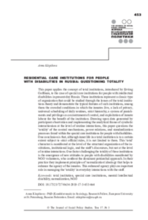Abstract
This paper applies the concept of total institutions, introduced by Erving Goffman, to the case of special care institutions for people [including children] with intellectual disabilities in present-day Russia. These institutions represent a classic type of organization that could be studied through the lenses of the total institutions theory and demonstrate the typical features of such institutions, among them the crowded conditions in which the inmates live, a lack of privacy, universal scheduling of daily routines, strict hierarchy, a system of punishments and privileges as an instrument of control, and exploitation of inmate labour for the benefit of the institution. Drawing upon data generated by participant observation and implementing the analytical frame of symbolic interactionism at the level of routine interactions, this paper questions the 'totality' of the control mechanisms, power relations, and standardization processes found within the special care institutions for people with disabilities. One conclusion is that, although inner life in a total institution is to a certain extent subject to strict official rules, it is not limited to them. This 'total' character is manifested at the level of the structural organization of the institutions, institutional logic, and the staff’s discourses, but not at the level of routine interactions. One factor challenging the totality of these institutions is the emergence of new attitudes to people with disabilities manifested by NGO volunteers, who confront the dominant patriarchal approach. In their practice they implement principles of 'normalization' ideology that helps to enhance the agency of the inmates. This enhanced agency plays an important role in managing the 'totality' in everyday interactions with the staff.

